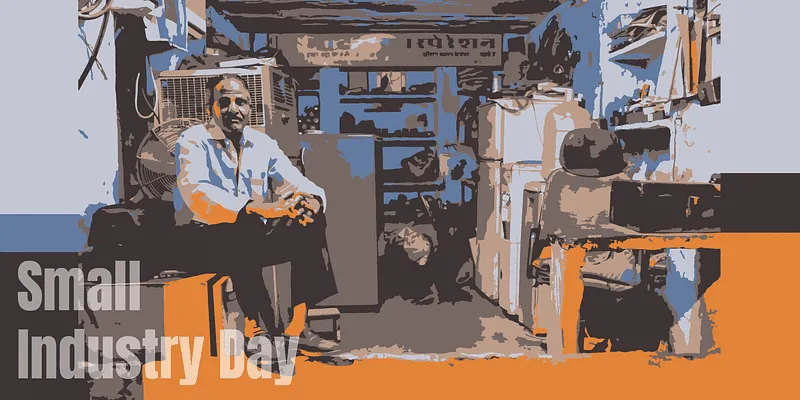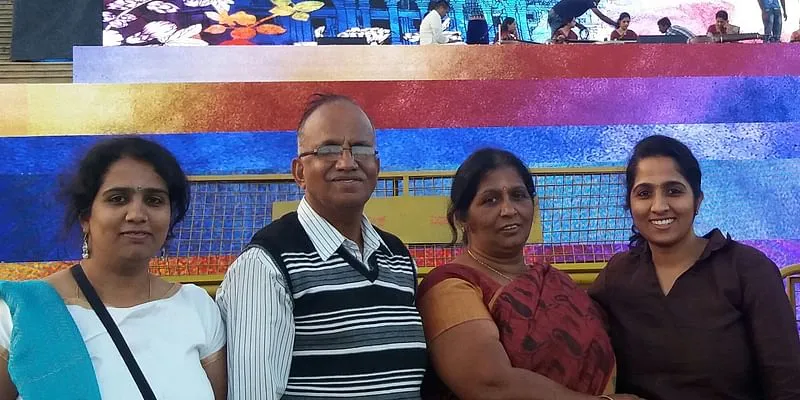Small Industry Day: How Indian SMBs are innovating and going digital amid COVID-19 crisis
Small scale industries are waking up to a reality where adaptability ensures survival amid the COVID-19 pandemic. This Small Industry Day, read how various SMBs from across the country are finding innovative ways to pivot their business and embrace technology.

For months, Coimbatore-based catering company Madhampatty Thangavelu Food Factory did not receive orders. And due to the COVID-19 pandemic and lockdown, there were no events happening in the city.
With no gatherings to cater to, managing partner Krishnakumar Thangavel was in a fix. He realised that he had to pivot the business, or risk shutting shop.
Madhampatty Thangavelu Food Factory usually catered to large weddings and events, and was proficient in making sweets. Krishnakumar and his partners decided to boost manufacturing of sweets and its sales.
They decided to go with , an end-to-end business process management solution company from the same city, to reach customers.
“This small catering business diversified into manufacturing sweets and went online with our solution. Madhampatty Thangavelu Food Factory is now fully managing ecommerce orders within the Effitrac platform”, says Founder and CEO of Effitrac, Logesh Velusamy.

Founder and CEO of Effitrac, Logesh Velusamy
With no clear indication about when large gatherings will become a norm again, Madhampatty Thangavelu Food Factory is managing to stay afloat through its sweets business.
Pivot and persist
Like the Coimbatore food enterprise, several small and medium businesses (SMBs) across India have realised that they have no choice but to pivot and persist.
Bengaluru-based energy bars company Koko Boost and founder Thejaswi S faced many obstacles.
Distribution too became a major challenge for the small manufacturer of millet and moringa energy bars. Owing to the small size of her business, Thejaswi found out that distributors were disinterested in retailing her products.
With the COVID-19 pandemic turning people’s attention towards essential goods, Koko Boost’s energy bar business took a hit.
Thejaswi observed that customers were more interested in immunity-boosting products, and decided to pivot. She launched a brand of immunity-boosting powders made from an ingredient she was familiar with - moringa.
“We ventured into making a new and innovative range of powders, including garam masala powder, spice powder, and karam podi. They are all made from moringa and come under a new brand name Santrupt,” she says.

Thejaswi S (left) with the Koko Boost team
Like Madhampatty Thangavelu Food Factory, Thejaswi started selling online. She started using Instagram and WhatsApp to promote her new products, and is now managing to keep Koko Boost afloat.
Noida-based Hula Global’s venture into PPE kits is another example of a successful pivot and persist.
The B2B apparel manufacturing company’s exports had completely stopped due to the pandemic.
Founder Karan Bose decided to leverage his existing garment manufacturing setup to manufacture PPE kits, N95 masks, face shields, etc., to meet the rising demand for such products in the country.
“There are very few PPE manufacturers in the country who have the expertise to manufacture N95s, coveralls, surgical gowns, and face shields – all under one roof. We thought we could do well in the sector with an unchanged operational chain,” he says.

Founder of Hula Global, Karan Bose
By May, Hula’s new product portfolio included various types of masks - FFP1s, FFP2s, FFP3s, N95s, surgical gowns – Level 2, Level 3, Level 4, and high-quality face shields (visors).
In June, Hula was producing 80 lakh masks per month, he claims. However, the company couldn’t supply its PPE products to Brazil, China, Thailand, and Saudi Arabia due to the ban on export.
Instead, it began supplying PPE kits and coveralls to Doctors Without Borders (MSF), the Indian Air Force, and the Indian Army through their government contractors and several local government bodies.
Going digital
Madhampatty Thangavelu Food Factory, Koko Boost, and Hula Global have shown that pivot and persist is one way to go for SMBs. More importantly, they have shown that traditional sales methods and existing retail strategies have to be revisited.
For small scale industries, reaching consumers digitally is not a luxury anymore.
In the last few months, Jaipur-based Indian Wedding Planners (IWP) has shown that engaging with customers and stakeholders digitally can help generate leads even when the industry is at a standstill.
IWP Founder and Partner Anant Khandelwal says, “During the pandemic, digitalisation became more important to us than ever before. We used social media platforms to reach out to industry stakeholders and have conversations with them. We invited leading hospitality brands, jewellery designers, makeup artists, celebrity performers, venue owners, bridal stylists, etc. for discussions. This helped us expand our reach and generate some leads.”
Despite the wedding industry taking longer than other industries to recover, Anant remains optimistic that the new leads will help the company once the wedding season arrives.

Founder and Partner of Indian Wedding Planners, Anant Khandelwal
For Vadodara-based girls’ hair accessories and apparel brand Ribbon Candy, digital technologies are transforming the way business is done.
Although marketing budgets are cut to reduce expenses, founder Meghna Gandhi is noticing a surge in online demand from impulsive buyers.
According to her, the Ribbon Candy website and ecommerce sites such as Myntra are bringing in sales despite the company working on bare minimum budgets.
Further, digital payments have become an important part of Ribbon Candy’s operational process. With contactless payments becoming the norm, Meghna’s customers and suppliers are transacting through UPI.
“Earlier, we used to do bank transfers. Most payments are now happening through Google Pay and Paytm as they are faster and more convenient,” she says.

Founder of Ribbon Candy, Meghna Gandhi
Kerala-based Sanson Chemical Industries, involved in the manufacturing and trading of technical grade copper sulphate for farmers, is also sustaining business by selling online.
Despite supply chain disruptions and raw material shortage, founder Xavier Kondody is expanding his sales network.
“We started doing product promotions and marketing online. This is helping us improve our sales network, especially through courier agencies which ship our small, packaged products for farmers,” he says.
Kolkata-based Naman Shah, who runs full-stack industrial procurement platform , also believes that SMBs should adopt digital solutions.
According to him, small businesses should be given incentives to adopt digital technologies.

Co-founder of NowPurchase, Naman Shah
“Countries like Singapore have given tax breaks and subsidies for digitisation expenses. If done in India, it could strengthen both tech and non-tech companies,” he says.
Naman, who is always looking to increase efficiency and productivity, says he has integrated NowPurchase’s procurement platform with web-based software suite and business communication platform Slack.
The big digital opportunity
NowPurchase is among a large number of Indian businesses adopting digital technology at a breakneck pace.
Even traditional businesses that preferred to remain informal are embracing technology to ensure formalisation and compliance.
“Small scale industries across diverse categories cannot rely entirely on their offline presence. They will have to inevitably adjust to the new norms of online buying. This could force every MSME to embrace omnichannel ecosystems and converge the operations of their online and offline stores. Not doing so will mean suffering huge losses in revenues,” Sandip Chhettri, CEO, TradeIndia.com, said in an earlier interaction.

COO of TradeIndia.com, Sandip Chhettri
The adoption of technology by small scale industries throws up a big business opportunity for companies that build digital solutions. The total digital opportunity offered by Indian SMBs could be worth $85 billion by 2024, according to a report. The real opportunity, in fact, could be much bigger due to the COVID-19 pandemic.
In a June 2020 report on Improving Economic Dynamism and Accelerating MSME Growth, digitisation was a key recommendation by the Global Alliance for Mass Entrepreneurship (GAME).
The report proposed that to revive small scale industries, India needs to digitise and streamline processes in order to reduce timelines, decrease parallelisation, and ease formalisation by creating six key platforms.
These platforms are labour compliance, EHS fillings, tax filings, information wizard, central inspection system, and single window for starting a new business.
(With inputs from Palak Agarwal)
Edited by Javed Gaihlot














